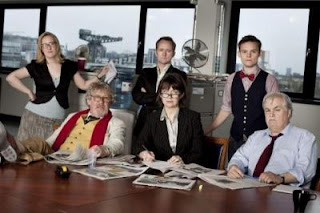Described
by Outburst Queer Arts Festival as a 'one woman queer revolution' and
a 'bona fide cultural icon', Penny Arcade had a lot to live up to.
As a specially devised show for Outburst, 'The Woman who Knew Too Much' samples work from Arcade's past performances.
After
a glowing introduction by Cian Smyth, Arcade bounded into the room
through the audience, her personality shining as she danced her way
to the stage. She proceeded what was to be a whirlwind introduction
to her world. Her crazy existence was replicated on the Black Box stage, her
performance chaotic from the outset. Despite the disarray, which
made me nervous at times, she settled into what would become a
beautiful and charming performance.
She
told stories of her own life, interspersed with monologues of people
such as her aunt in Soho, a homeless girl suffering from Aids and
drag queen Dame Margo Howard Howard. These characters were at times
amusing, at times heartbreaking and acted as an illustration of the
times Arcade lived through; times of gay liberation, the cultural Renaissance of the sixties and the NEA Culture Wars of the nineties.
Associations with cultural icons such as Quentin Crisp and Andy
Warhol are discussed in the rundown of her rollercoaster life, as are
her dealings with prostitution, rape and drugs.
Peppered
with references to Northern Ireland, Arcade grounded herself well to
the locality. In particular a reference to veteran gay rights
campaigner P.A. Mag Lochlainn who died last week was met with a loud
cheer from the audience. She thanked all the barmen and technicans
by name which was a lovely touch.
Penny Arcade was courageous,
honest and enlightening, nostalgic and enchanting. She believes that
if you tell the truth in Ireland and are funny then it's hard to go
wrong. And she was right.



